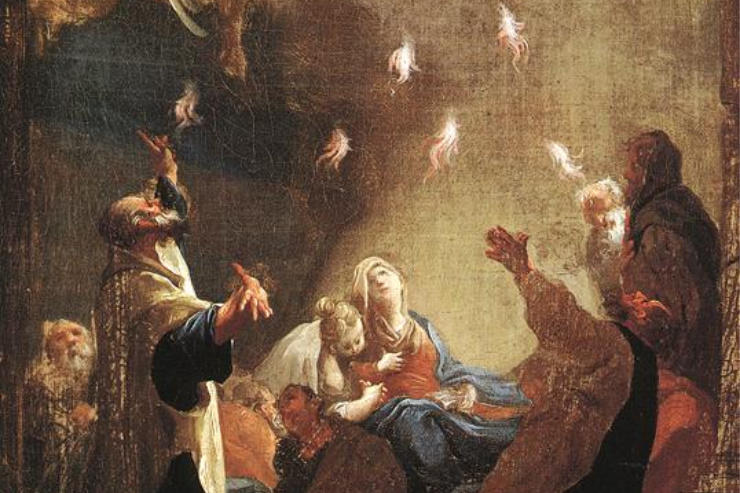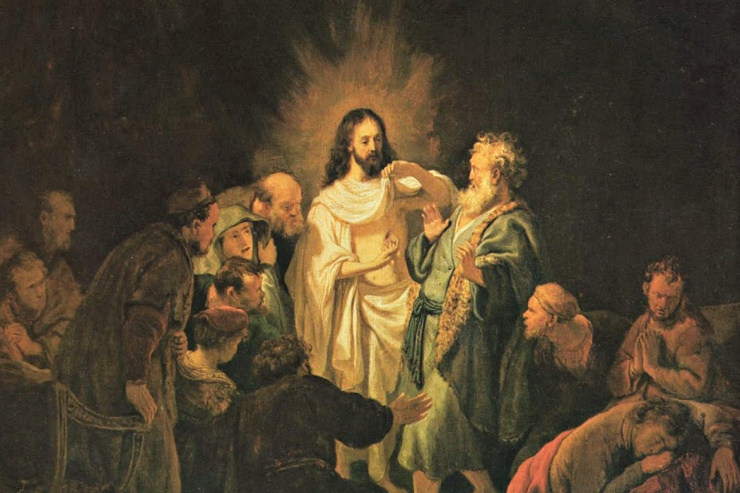
“Pentecost (detail) by Josef Ignaz Mildorfer [Public domain], via Wikimedia Commons
“We cannot use the excuse that we’re not smart enough, holy enough, or articulate enough. If we have been given the Spirit, we must be witnesses.”
In a Church known for its “smells and bells,” one of the best smells is sacred chrism. From the heads of little babies to the palms of new priests, this rich-smelling sacramental reminds us that a transformation has taken place.
Throughout the Old Testament, there are three different groups that are anointed: priests, prophets, and kings. In addition to being a sign of abundance and joy (see Psalm 23:5), anointing was a sign of consecration. In Leviticus, Moses anoints the tabernacle, the altar, and the instruments in the tent of meeting, and also anoints his brother Aaron: “And he poured some of the anointing oil on Aaron’s head, and anointed him, to consecrate him” (Lev. 8:12). Elijah anoints Elisha; Samuel anoints Saul and David.
These people were consecrated, set apart, for a specific mission. When they’re anointed, the Spirit rushes upon them: “Then Samuel, with the horn of oil in hand, anointed him in the midst of his brothers, and from that day on, the Spirit of the Lord rushed upon David” (1 Sam 16:13).
But the prophet Joel reveals something important. Someday, the Spirit will rest upon not just kings, but servants: “And it shall come to pass afterward, that I will pour out my spirit on all flesh; your sons and daughters shall prophesy, your old men shall dream dreams, and your young men shall see visions. Even upon the menservants and maidservants in those days, I will pour out my spirit” (Joel 2:28-31).
Imagine the shock to Joel’s listeners. Maids? Servants? Old men, young men, sons, and daughters? Anointing wasn’t something just thrown about – it was serious business. Remember, David wasn’t willing to kill Saul when his very life was in danger because Saul was the Lord’s anointed. But now the prophet Joel is acting like the gift of the Spirit is going to be given liberally.
Shortly after the Ascension, during the great Jewish feast of Pentecost (which celebrated the giving of the law to Moses on Mount Sinai), the Apostles and early disciples were gathered in the Upper Room. The Spirit descends upon all those there. When the crowds react to hearing the Apostles speaking in their native tongue, Peter corrects their misunderstanding:
“Then Peter stood up with the Eleven, raised his voice, and proclaimed to them, ‘You who are Jews, indeed all of you staying in Jerusalem. Let this be known to you, and listen to my words. These people are not drunk, as you suppose, for it is only nine o’clock in the morning. No, this is what was spoken through the prophet Joel’” (Acts 2:14-16, emphasis mine).
In the New Covenant, all receive the Holy Spirit and all are consecrated. Even menservants and maidservants are capable of the charismatic gifts because they have been consecrated, set apart, for mission.
Anointing was a sign of the Messianic Age, an age Jesus proclaimed had arrived when he opened the scroll in the synagogue and read Isaiah 61 out loud: “The Spirit of God is upon me, because He has anointed me to preach good news to the poor…” (Luke 4). The Catechism explains, “This fullness of the Spirit was not to remain uniquely the Messiah’s, but was to be communicated to the whole messianic people. On several occasions Christ promised this outpouring of the Spirit, a promise which he fulfilled first on Easter Sunday and then more strikingly at Pentecost. Filled with the Holy Spirit the apostles began to proclaim ‘the mighty works of God,’ and Peter declared this outpouring of the Spirit to be the sign of the messianic age. Those who believed in the apostolic preaching and were baptized received the gift of the Holy Spirit in their turn” (CCC 1287).
We are those menservants and maidservants; we are those sons and daughters. Since we have received the Holy Spirit in Baptism and Confirmation, we too are consecrated, set apart, for mission. This Sunday, ask for a renewal of the zeal of the Holy Spirit. Just as we renew our baptismal promises at Easter, recall that day of your Confirmation. Whether you knew it or not, you received the same special outpouring of the Holy Spirit as was given the day of Pentecost (CCC 1302). One of the effects of the sacrament is that it “gives us a special strength of the Holy Spirit to spread and defend the Faith by word an action as true witnesses of Christ, to confess the name of Christ boldly, and never to be ashamed of the Cross” (CCC 1303)
Pentecost gave the disciples the power to be witnesses. This is exactly what we see through the Acts of the Apostles: men who rejoice at being persecuted for the name of Christ. They have become defenders of the truth, proclaiming the mystery of the Cross boldly, despite ridicule and suffering. It wasn’t due to their own talents, expertise, or abilities. It was the Holy Spirit. That should give us great courage. We cannot use the excuse that we’re not smart enough, holy enough, or articulate enough. If we have been given the Spirit, we must be witnesses. If we have been anointed, we’ve been given what we need to go out and proclaim the Gospel – provided we are docile and open to Him and His gifts.
Are you a witness? Do you live as if you’ve been anointed? You have been set apart for a mission. Ask the Holy Spirit this Pentecost to increase His zeal in your heart so that through you, He may renew the face of the earth.
Please share this post on Facebook and other social media below:














